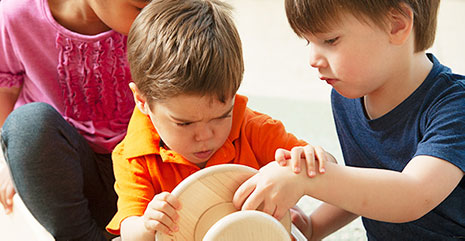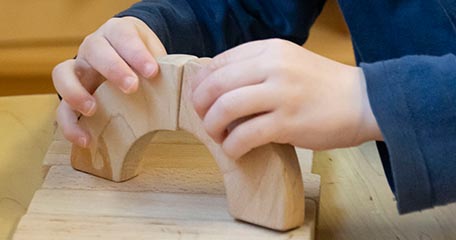Resetting pandemic screen time
| May 2021It’s time to pause for a moment and think.
How are we weathering pandemic screen time? How will we put it in its proper place when all of this is over? And how is it shaping our roles as parents and professionals in the meantime?
Parents of young children found their world turned upside down in 2020. Stressful safety precautions, economic realities and logistical changes painted daily life as a starkly different picture than the one they had been living. We became frustrated and confused. Zoom connected us with loved ones and allowed us to participate in our school and work communities. At the onset of the changes, many imagined screens as the saviour. But, over time, adults and children experienced the fatigue of a 2D existence.

The brain interprets all screen-based activity as a form of stress.
More than ever, infants born during this Covid pandemic will experience almost immediate exposure to screens. As parents work from home or are required to leave their baby with relatives, avoiding screens may not be in the forefront of their minds. They also want relatives, especially grandparents, to safely see the babies via video chat.
But, according to a survey released by the Pew Research Center in July of 2020, 84 percent of parents are deeply concerned about the increase in their children’s screen time. The survey reveals a 100 percent increase in kids’ screen time since the lockdown started. And 2/3 of the Pew respondents believe that parenting is harder today than it was 20 years ago, citing technology as the reason.
However, if we go beyond the statistics and unpack the feelings, we can make a complex issue much simpler. What happens to us as parents when we see our children attached to a screen? There is some immediate relief that the child is quiet and entertained. But, shortly thereafter, a sense of anxiety ensues. We know in our gut that it’s a solution that falls short of providing children with what they really need–opportunities for free play, exploration, problem-solving, social interactions, eye contact and direct response from loving adults.
What appeared to be a temporary situation extended, and very soon we at the Children’s Screen Time Action Network began fielding questions from parents about the long haul. We’ve been referring them to our Resource Library, which is packed with tips on how to minimise the impact of this current situation and how making small efforts now will avoid problems in the future. I encourage you to visit and explore.
William Temple, who was archbishop of Canterbury and leader in educational reforms, is quoted as saying, “The most influential of all educational factors is the conversation in a child’s home.” Parents are a child’s first teacher, while educators create love of learning through their very relationships with the children.
Yet, the neurological chaos excessive screens create for children can make it difficult for them to learn. Dr. Victoria Dunckley, author of Reset Your Child’s Brain, explains that because screen time provides unnaturally high levels of stimulation, the brain interprets all screen-based activity as a form of stress. With each interaction, the entire nervous system goes into varying degrees of fight-or-flight.

Without panicking, parents can choose to use this time to cultivate a deep connection with their children – an opportunity they may never get again. Creating some unplugged time now will play out in stronger family relationships and have long-lasting implications for children’s sense of safety and how they deal with similar difficulties later in their lives.
The key to surviving Covid screen time and keeping it in its place is maintaining a positive vision of the future and trusting ourselves as parents and educators:
- Say it out loud. You know you don’t want life to be like this forever. Our families weather all kinds of unusual and traumatic situations and then return to an even keel. Keep reiterating aloud, “Just during the pandemic…” and “For now we’re allowing it, but when we can get back to enjoying ______, there won’t be as much.” (Fill in the blank with your favourite family social activity like swimming, visiting relatives, gymnastics, ballet, scouts, etc.)
- Remind yourselves and the children that the next phase will be fun. Just like you might prepare kids for a trip or a big family event, start talking about what life will be like after the pandemic, setting expectations in a way that makes that vision seem like more fun than this one (and it will be!).
- Stay in the micro-moment. If you’re working and your toddler dumps spaghetti on the floor, make a finger painting out of it. Laugh, then wait a few moments before cleaning it up together so that it doesn’t seem like a tragedy, just one of those silly moments to share.
- Focus on play. While screen time may have increased, a child's need for screen-free play has increased as well. The more chaotic their world, the more emotional need for true play that helps them process life events and grow in multidimensional ways.
- Consider the long term. What we all want as parents is a cherished relationship with this child as they grow. We want a child who is resourceful and resilient. By letting screen time swallow large chunks of time, we are siphoning from both. When screens present as the centre of family life, maybe we can ask ourselves what part is unavoidable and what part can be substituted with the ideas and tips available in our Resource Library.

We also welcome you to join the Action Network, as we call it for short, a community of like-minded practitioners, educators, advocates and parents working to reduce the amount and impact of screens in childhood.
This time will pass and we’ll soon be talking about the silver linings: “I had more time with my kids. I know them better as individuals. I can understand what makes them tick.” For now, let’s try a personal approach. It may reduce the stress in the short term to know kids are resilient and for them, COVID will soon become a faded memory.
References
Auxier, B., M. Anderson, A. Perrin, and E. Turner. 2020. “Parenting Children in the Age of Screens.” Pew Research Center. Published online July 28,2020 https://www.pewresearch.org/internet/2020/07/28/parenting-children-in-the-age-of-screens/
Dunckley, V. L. 2015. Reset Your Child’s Brain: A Four-Week Plan to End Meltdowns, Raise Grades, and Boost Social Skills by Reversing the Effects of Electronic Screen-Time. San Francisco: New World Library.





